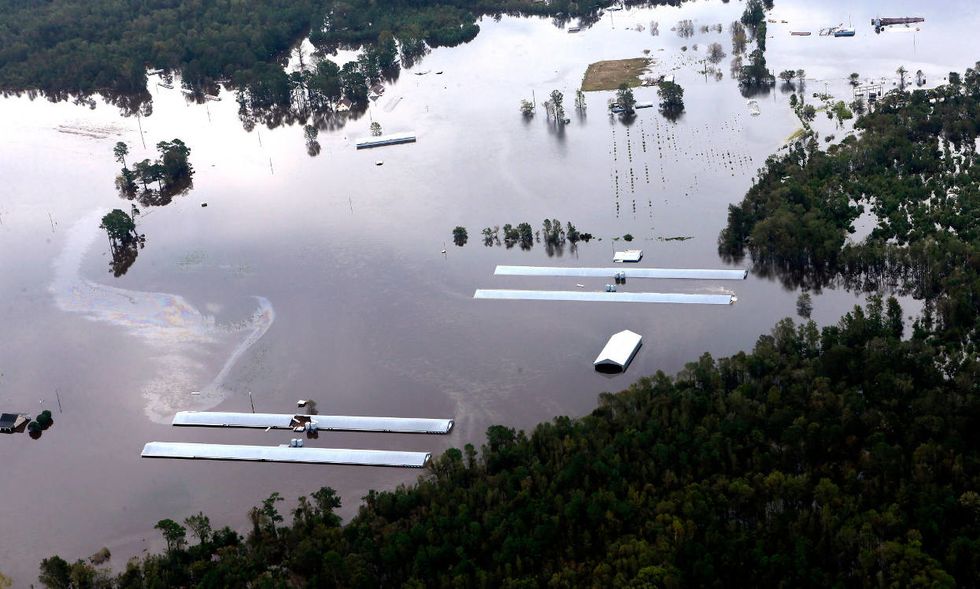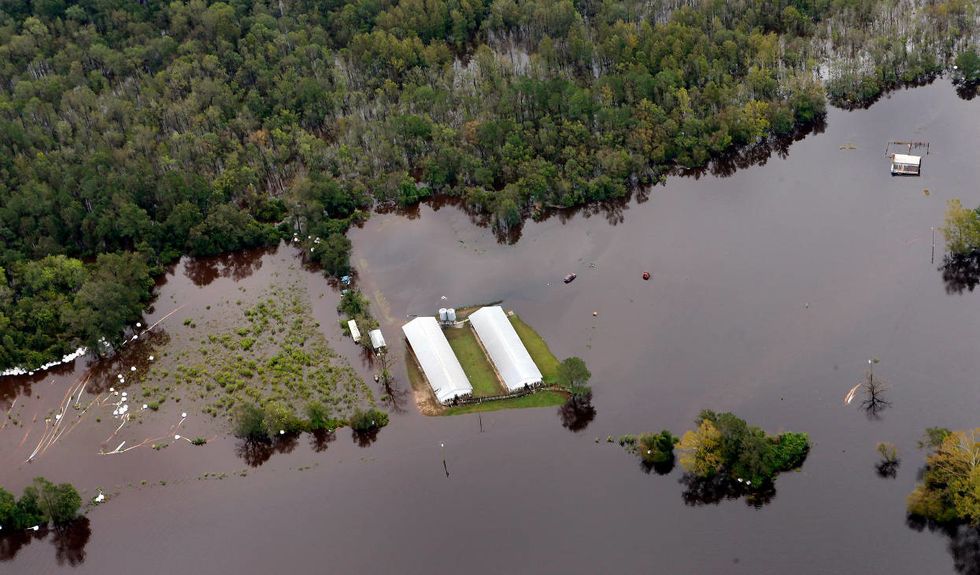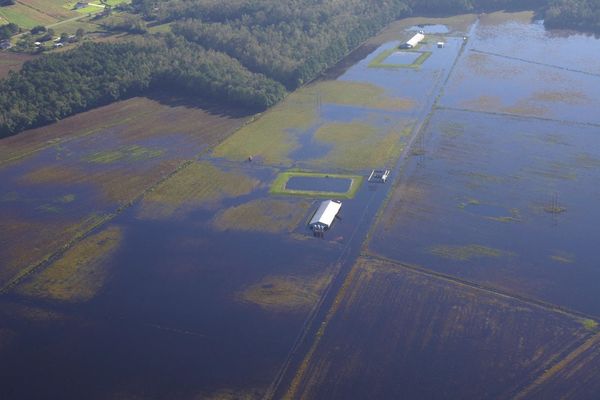hog lagoons
NC bill would ease hog farm biogas permitting
This year's farm bill includes a provision creating a general permit for animal operations to build and operate farm digester systems for capturing methane for energy.
Burning pig poop fumes doesn’t solve anything
Florida’s crisis highlights a nationwide risk from toxic ponds
A hog waste agreement lacked teeth, and some North Carolinians say they’re left to suffer
Could Smithfield Foods have prevented the “rivers of hog waste” in North Carolina after Florence?
In North Carolina, hog waste pollution a familiar result. Will things ever change?
As Hurricane Florence floods dozens of hog waste pits, many in the state are wondering when the broken factory farm system will be fixed
NEW BERN, NORTH CAROLINA —The full extent of Hurricane Florence's environmental damage isn't yet known in North Carolina, where waste from factory farms, coal ash, and other pollutants are contaminating floodwaters still on the rise after the largest East Coast deluge north of Florida in history.
But there's at least one chapter in the unfolding Florence epic that's been written before: Open-air pits of animal feces – periodically reduced by spraying excess liquid onto crop fields – are spectacularly ill-suited to hurricanes and tropical storms.
In a changing climate, these events are becoming more frequent and severe, and clean water advocates say it's more urgent than ever to shut down waste pits in areas most likely to flood and to phase out the antiquated systems altogether.
After the storm passed, the network of riverkeepers took to the air again, patrolling for flooded waste pits and more illegal spraying. All week the group has documented problems that track with regulators' running online tally of waste pit failures, which is based on reports from farmers. As of noon Thursday, more than 100 pits were impacted by the storm, a handful with structural damage and dozens having overflowed or inches away from doing so.
The riverkeepers painstakingly track the violations and send them to state officials, who normally might investigate the problems firsthand and later penalize wrongdoers. Right now, though, the watchdogs say their aim is less to punish individual farmers and more to highlight the impossible position the industry's outdated waste control strategy puts them in.
"We're just doing our due diligence to continue to have that stockpile of evidence that this is a bad practice and needs to be changed," Matt Butler, program director at Sound Rivers, a member of the Waterkeeper Alliance, told EHN.
So far, he said, "with Hurricane Matthew in 2016 and now with Florence, we just keep repeating the same mistakes."
‘Making this soup of eastern North Carolina’

Duplin, NC. Photo taken Sept. 17, 2018. (Credit Waterkeeper Alliance, Inc.)
New factory-scale farms with waste pits have been banned here for more than 20 years. Yet with 9 million hogs, North Carolina still produces the second most pork in the country. Dominated by multinational corporations that contract with local farmers, the industry is concentrated in the state's low-lying southeastern coastal plain – exactly where Florence shattered rainfall records
Even in fair weather, the state's 2,100 facilities, all decades old, pose problems. . Odor and pathogens from animal barns, waste pits, and spray fields can torment and sicken neighbors, prompting three juries this year to award hundreds of millions in damages to plaintiffs suing Smithfield Foods, the world's largest pork producer. Other suits are in the offing.
A Duke University study published online this week reinforced these neighbors' concerns, citing low life expectancy in communities near confined animal feeding operations, even after adjusting for socioeconomic factors known to affect health and lifespan.
All of these threats are amplified after heavy rains. Fields saturated with rainwater can't absorb nutrients from waste pits; excess nitrogen and phosphorous instead appear in rivers and streams, at worst causing algae blooms and fish kills. Manure pits can burst or overflow, sending sludge, microbes, and potentially antibiotic-resistant bacteria into floodwaters, heightening their risk to public health.
"You're releasing all of that and making this soup of eastern North Carolina," said Ryke Longest, director of Duke University's environmental law clinic.
Hurricane Floyd in 1999 was a worst-case scenario, causing structural damage to six waste pits and flooding 55 others, according to the North Carolina Pork Council. Tens of thousands of hogs perished. After the flooding receded, water sampling revealed dangerous levels of E. Coli and other bacteria associated with food poisoning, the Waterkeeper Alliance and the Environmental Working Group say.
In the storm's wake, policymakers established a voluntary buyout program to move hog operations from the 100-year floodplain, the areas near rivers and creeks with a 1 percent annual chance of flooding. The initiative had initial success, shutting down more than 100 waste pits at 43 facilities at a cost of $18 million. Officials estimate 32 of them would have flooded during Hurricane Matthew in 2016, the last monumental storm to ravish eastern North Carolina.
Past time for new technological requirements

Photo taken Sept. 18, 2018, in Greenevers, NC. (Credit: Waterkeeper Alliance Inc)
Until this year, however, the program hadn't received a new injection of funds in more than a decade, and about 60 factory hog farms remain in the 100-year floodplain. It's too early to tell how many of these facilities are the ones now overflowing, but state officials, the pork industry, and environmental advocates agree investing more in the program should be a priority.
"We've had very diverse support from a variety of groups," said Vernon Cox of the North Carolina Department of Agriculture, who oversees the program, "and we believe there's a benefit for everybody involved. We're able to help [farmers] out of a difficult situation — as well as the environment."
Still, most experts say focusing only on the 100-year floodplain would be a mistake. Thanks to climate change, heavy rains are expected to be the new normal. Florence was considered a 1000-year storm; Matthew from two years ago was considered a 500-year storm.
At the same time, many farmers whose lagoons are now on the verge of overflowing face a difficult choice of violating their permits by spraying onto fields, harming rivers and creeks in the long term, or risking direct discharge of waste.
Regulators haven't yet decided whether to relax spraying limits, but they have in the past.
"The reality [is] that spraying on saturated soils may be the lesser evil as compared to risking additional breaches after the storm," said attorney Robin Smith, a former state assistant secretary with North Carolina Department of Environmental Quality.
Related: Peak Pig — The fight for the soul of rural America
That's why advocates say all hog facilities should phase out open-air waste pits and convert to more sustainable systems already used in other states and countries. They point out the DEQ has the opportunity to push for just that this fall, when it debates renewed permitting standards for existing farms.
"They [keep] renewing the permit on these old, old lagoons as if these things are brand new, yet many of them have been in service for more than 20 years," Longest said. "They are over time going to be prone to leak, and the hardware and equipment associated with them over time is going to break down and need to be replaced."
"As that time comes around," he continued, "the Department should determine which of these are failing – and have failed – and then new technological requirements should be placed on those farms."
By covering waste pits, capturing methane gas from the waste, and burning it to create electricity, hog facilities can both limit water pollution and curb potent greenhouse gases. Eleven farms around the state capture and convert biogas today.
Tom Butler, one of the farmers with a lagoon cover, said earlier this year it stopped 2.8 millions of rainwater from becoming waste during Hurricane Matthew.
"I love to tell this story," Butler said with pride. "When a raindrop falls into an open lagoon, it becomes part of your farm's waste, when it falls on our cover we just pump it off."
Easier said than done

(Credit: Waterkeeper Alliance Inc.)
Of course, all of these solutions are easier said than done. The state's DEQ is understaffed and underfunded, its budget slashed by more than 40 percent since 2012. Even before the GOP took control of the Legislature in 2010, regulators faced pressure from a political establishment anxious to protect the state's largest industry, a multi-billion endeavor.
At the same time, decades of bitter battle have calcified distrust between the pork industry and environmental advocates, making even meager progress toward better waste technology like biogas contentious.
Nuisance lawsuits and the spotlight on the industry due to hurricanes has put the North Carolina Pork Council, Smithfield Foods, and their allies on the defensive. They point out that breaches and floods tend to occur on just a tiny fraction of the state's 3,700-some waste pits.
"While some of our farms did experience damage, the impact was relatively minor considering the extreme severity of the storm and our expansive footprint in the state," Kiera Lombardo, senior vice president of corporate affairs for Smithfield, said in a statement after Florence.
State agricultural officials estimate 5,500 hogs and 3.4 million poultry are dead, most trapped in barns flooded by the storm.
And while Waterkeepers' dogged air patrols have caught contract farmers violating the law, they say the real culprits are the giant corporate conglomerates that take no responsibility for the waste their hogs produce.
"It probably sounds a little strange coming from an environmentalist, but I do feel for these people who have invested their entire lives into growing hogs under a system that is broken," said Crystal Coast Waterkeeper Larry Baldwin. It should be up to Smithfield and its cohort, he said, "to say how do we take some of the billions of dollars that we're making in profit and turn it back around to find a better system."
Smithfield and the Pork Council did celebrate in April when $5 million was added to the floodplain buyout program, though it is expected to close down lagoons on only four to six facilities. Cox, with the Department of Agriculture, said an agreement with the federal government for some of these funds was finalized just last week, and the state will start taking applications by the first of next year.
In the meantime, advocates like Baldwin will keep pushing for even more meaningful reforms and hoping the next big storm doesn't come too soon.
"We're not even through hurricane season yet," Baldwin said.










